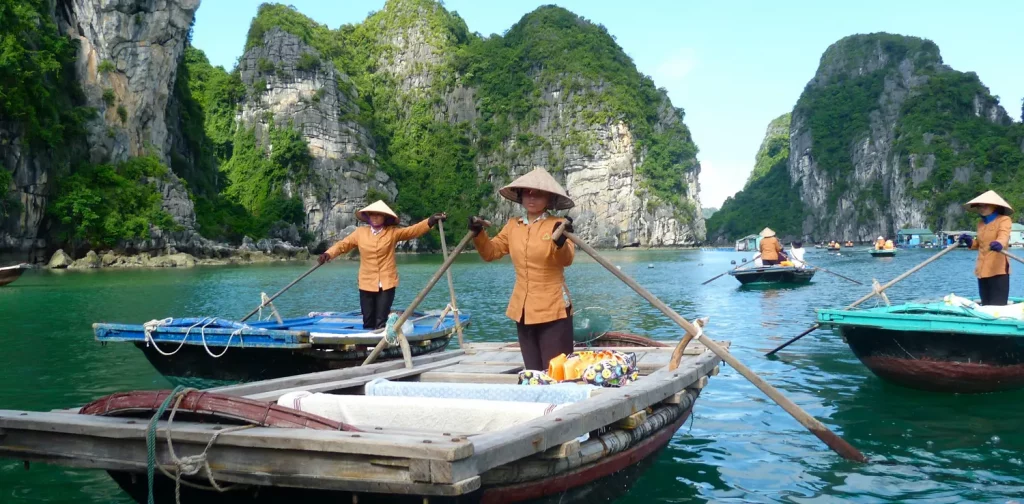Optimizing Vietnam’s Sea Potential with Blue Economy Scenarios

Photo by Gary Cacciatore on Unsplash
Oceans and seas make up 71% of the earth’s surface. However, they are slowly losing their ability to absorb carbon dioxide due to climate change and suffering from the exploitation of natural resources and unsustainable economic practices.
Vietnam is one of the countries blessed with a magnitude of coastline. If developed through sustainable practices, Vietnam’s coastlines and seas have the potential to support the country’s net-zero commitments. Recently, the nation has been tapping into blue economy scenarios to enhance its marine potential.
Vietnam’s ocean opportunities
The World Bank defines a blue economy as the “sustainable use of ocean resources for economic growth, improved livelihoods, and jobs while preserving the health of the ocean ecosystem.” It covers various aspects, namely renewable energies, tourism, fisheries, maritime transport, climate change, and waste management.
Vietnam’s coastline spans 3,260 kilometers; the economy of 28 coastal provinces and cities accounts for almost half of the nation’s gross domestic product (GDP). Such an important industry and resources need proper management to avoid water-related crises, especially in the light of rising sea levels. This is where the blue economy scenarios come into the picture.
Blue scenarios for six marine sectors
The UNDP collaborated with the Vietnam Administration of Seas and Islands (VASI) to publish a report titled Blue economy scenarios for Viet Nam.
The report offers several insights covering six sectors for blue economy scenarios:
- Fisheries and aquaculture
Despite promising numbers in 2019, the government has been limiting inshore fishing due to the decline of fishery resources. The blue scenario suggests reducing fisheries catch by 2% per year, maintaining aquaculture area, and improving management to reach a 3.5% productivity increase per year to foster sustainable fishing practices.
- Oil and gas
While the country’s gas production remains steady, the number of investments in oil & gas production is declining. The report recommends promoting energy-saving within oil & gas activities, enhancing the protection of the environment, and increasing participation in the emerging marine renewable energy production.
- Marine renewables
Vietnam has abundant marine energy resources, namely electricity generated from offshore winds, tides, waves, and ocean flows. However, the potential has yet to be fully explored. The report recommends a rapid expansion of marine renewables, achieving 10,000 MW by 2030.
- Tourism
Marine tourism takes up ⅔ of Vietnam’s tourism sector. The report recommends promoting 8-10% growth per year for international visitors and 5-6% per year for domestic tourists, reaching 1.6 million tourist beds with 65% occupancy, and embedding climate change impacts in tourism planning to increase tourism growth by 2030
- Maritime transport
In 2019, nearly 493 million tons of goods were transported by the sea. However, foreign shipping lines dominate about 90% of Vietnam’s international transport market share. The blue scenario’s goal is to increase maritime transport share from 20.6% to 22.84% by 2030.
A step towards sustainability
By implementing blue economy scenarios, Vietnam could improve the country’s overall GDP. Facilitating the marine economy will also enable Vietnam to realize Sustainable Development Goals (SDGs), including Goal 8 on decent work and economic growth and Goal 12 on responsible production and consumption. Eventually, the effort to pursue sustainability should encompass every possible sector to ensure that no one is left behind.
Editor: Nazalea Kusuma

Kresentia Madina
Madina is the Assistant Manager of Stakeholder Engagement at Green Network Asia. She holds a bachelor’s degree in English Studies from Universitas Indonesia. As part of the GNA In-House Team, she supports the organization's multi-stakeholder engagement across international organizations, governments, businesses, civil society, and grassroots communities through digital publications, events, capacity building, and research.


 Reframing Governance in the Era of Water Bankruptcy
Reframing Governance in the Era of Water Bankruptcy  Strengthening Resilience amid Growing Dependence on Space Infrastructure
Strengthening Resilience amid Growing Dependence on Space Infrastructure  Indian Gig Workers Push Back Against 10-Minute Delivery Service Strain
Indian Gig Workers Push Back Against 10-Minute Delivery Service Strain  Call for Governance: Grassroots Initiatives Look to Scale Efforts to Conserve Depleting Groundwater
Call for Governance: Grassroots Initiatives Look to Scale Efforts to Conserve Depleting Groundwater  Integrating Environment, Climate Change, and Sustainability Issues into Education Systems
Integrating Environment, Climate Change, and Sustainability Issues into Education Systems  Finally Enforced: Understanding the UN High Seas Treaty
Finally Enforced: Understanding the UN High Seas Treaty